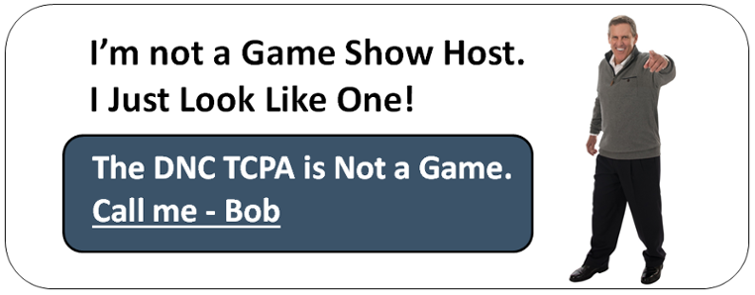 You almost can't buy outside leads today as a Business to Business outreach entity. Traditionally, B2B's have casually sold prospects among themselves, eventually losing track of where each came from - if it had proper TCPA compliant language or how many times it had been re-jiggered. This worked pretty well until cell laws became owner agnostic in 2013 and litigation increased, particularly against companies calling other companies.
You almost can't buy outside leads today as a Business to Business outreach entity. Traditionally, B2B's have casually sold prospects among themselves, eventually losing track of where each came from - if it had proper TCPA compliant language or how many times it had been re-jiggered. This worked pretty well until cell laws became owner agnostic in 2013 and litigation increased, particularly against companies calling other companies.
-
Speed1x
-
Quality720p
Hi! We're Wistia. We provide business video hosting to attract, engage, and delight

Thanks for reporting a problem. We'll attach technical data about this session to help us figure out the issue. Which of these best describes the problem?
Any other details or context?
6 call problems facing B2B's:
1. Consumer Plaintiffs outrageous TCPA claims.
Licensed lawyers can be sanctioned by a judge for bringing bogus TCPA charges. Professional consumer litigants are not punished. Further, consumer litigants don't need to pay expenses if they lose. But the big problem: Answering plaintiffs outrageous TCPA complaints. Unlike professional attorneys, consumer litigants have no intention of settling. Accusations tend to be more involved and for higher initial amounts. And as any TCPA defense attorney will tell you, "I hate going up against the amateurs because they're so unreasonable, time-consuming and expensive."
2. Consumer litigants chew up legal TCPA time.
You've still got to answer these claims whether you're right or wrong: "Where the heck did that lead come from anyway?" And settling can quickly become the only option, but nobody really knows where that lead came from or can prove it if they do! The numbers rapidly go from the $2,000 nuisance claims to $10,000 and up. Now you're talking severe damage to most small business internet loan companies.
3. Lead vendor extortion.
Everyone in the B2B lead generation chain is vulnerable. Platform providers, lead creators, middleman resellers, third and fourth resellers. Frustrated participants in the chain will sometimes sue each other, unwilling or unable to pay extortion fees to plaintiffs shaking the vendor tree.
4. Bogus Litigator Scrubs vs the real thing.
B2B's sometimes circulate lists claiming to contain previous TCPA court case numbers. We've come across some of these records, compared them against the top Litigator Scrub, and found them to be ineffective. If you choose to do a Litigator Scrub to help eliminate past call prohibition court filers, go to a reputable source. A Litigant List should be updated by about 1200 numbers per month and requires alot of case validation and number checking to be productive. A legitimate Litigator TCPA List is not expensive, yet can be very useful in just not calling the pro plaintiffs.
5. Plaintiffs will make you teach them TCPA law.
Plaintiffs claims tend to throw every possible call accusation against the wall to see what sticks. You, as the business owner or call center operator, end up educating them. This takes time and expertise on your part - and lots of patience. When should you hand off a pro-plaintiff complaint to your attorney at $500 per hour? Should you even answer the claim at all? By attempting to educate the plaintiff, are you just giving them more ammunition?
6. Most B2B's seem to be O.K. with call lawsuits?
They must be because compliance jockeys like us don't hear from them much. We know they're in court alot though. B2B's tend to look internally or to trusted competitors for lead compliance advice. They were exempt from these call laws for so long, it's tough to turn that ship around with proper protections. And B2B's tend to have a higher tolerance for ticky-tack settlements, say $1000 to $2000 - but are not sure how to proceed as compliance violation figures creep higher to the $5,000 and $10,000 range. With the 900 lb gorilla class actions always lurking in the background.
The Solution.
First off, B2B's need to get that there's a problem reaching out here. Traditional denial isn't helpful today. Secondly, the government will keep making laws designed to catch the bad guys routing bogus sales calls all over the world. Professional consumer litigants will continue to catch you instead.
Lead source validation is a good start. And try creating your own internal marketing prospect lists. That way you're less likely to get caught in the lead vendor verification chain. Make sure web forms contain standard compliance language like, "Filling out this form is not a condition of any sale." And "By clicking 'yes' we have permission to call you via a live operator, recorded voice, auto-assisted dialer or text."
If you do buy leads, be careful where they came from. Know that lead lists from Linkedin, Twitter and Facebook are littered with problematic "hybrid" cell phone numbers previously hidden.
TCPA fines are the fastest growing and most expensive portion of call prohibitions now - More than FDCPA, FCRA, and related CFPB fines, not to mention direct FCC and FTC call violations. If you are going to venture into these waters, consider the council of a Do-Not-Call/TCPA Law Compliance Service Provider. These are the boutique companies that have helped protect businesses since the inception of these laws in 2003. They'll help increase your amount of callable numbers while decreasing the chances of having to defend yourself against less-than-clear TCPA interpretations.
For more information on prudent, cost-effective B2B call protections, call my personal line at 561-317-3001 or email me here - Bob
Related Articles:
-
Calling Businesses: Try a Litigator Scrub for TCPA, DNC, FDCPA and FCRA first.
-
The Groups most likely to file Do Not Call & TCPA Litigation Against You
-
I only call other Businesses (B2B) - So I am Exempt from Cell Phone Compliance, Right?
-
Why B2B Marketers Must Scrub Cells Now for TCPA Law Compliance







